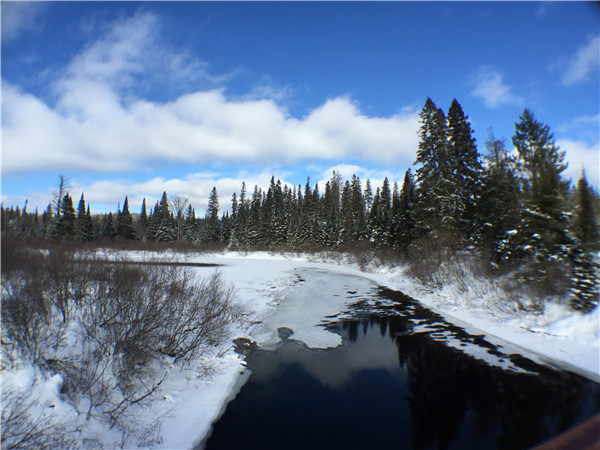A blissful discovery
Updated: 2016-03-05 11:44
By Wang Yan(China Daily)
|
||||||||
 |
|
Oxtongue River. [Photo by Wang Yan/ For China Daily] |
One of the things I love most about travel is the element of surprise. You can spend weeks beforehand doing all the homework you like, but you can always be guaranteed to return home with tales of the unexpected.
On this trip the first surprise that awaited me was the road conditions.
I reckon I was well within my rights to fret over the heavy snow that had fallen in the area in the days before we set out. Snow may look wonderful on picture postcards, but if you have had any experience of the kind of travel chaos that heavy snowfall can generate, as I had, you will understand where I am coming from and was going to. In fact snow flakes were still fluttering about as we set off.
However, it turned out that my worries were ill-founded. For three hours we drove on clean, snow-free and well-salted highways. Rachel, my friend and traveling companion who has plenty of local experience, reckons the local snow removal companies do a great job.
"No matter how much snow you get at night, the driveways are always cleared by the morning," she says. "You do need to ensure that your car has winter tires though, for safety reasons."
The second surprise was the pine trees.
Two days after I returned from the trip, I was telling a friend, Alex, about them. Instead of talking about things visual, as I generally do, I found myself enthusing about how impressed I was when I heard the wind whooshing through the pine trees.
"I'm not surprised you noticed the pine trees," says Alex, whose family is from the Algonquin area north of Toronto, and seems to have spent many summers in the park.
"Of course I would notice the pine trees," I say. "They provided the only non-wintry color in the park."
But he was not referring to that. Apparently it was the great pine trees that attracted one of the earliest groups of human visitors to the area hundreds of years ago.
In Alex's comment there was a faint echo of a vivid description on the park's website: "Living in remote, primitive camps, they (the loggers) felled and squared the giant pine, and when spring came, drove them down swollen rivers to the Ottawa River and the outside world."
The good news for modern generations is that in their dealings with these prime woods the pioneers appear to have shown enlightened mercy, and today the pine trees continue to flourish.
My third surprise was the lakes in the park, or, to be more accurate, how many there were.

 Boao airport all set for upcoming Asian forum
Boao airport all set for upcoming Asian forum
 Snapshots from the 'two sessions'
Snapshots from the 'two sessions'
 Turn of virtual reality cameras at two sessions
Turn of virtual reality cameras at two sessions
 China's home-made expedition mothership 'Zhang Qian' to be launched in March
China's home-made expedition mothership 'Zhang Qian' to be launched in March
 Top 10 countries boosting China's tourist inflows
Top 10 countries boosting China's tourist inflows
 Airplane restaurant to open in Wuhan
Airplane restaurant to open in Wuhan
 World premiums at Geneva Motor Show
World premiums at Geneva Motor Show
 China's top 10 tech startups
China's top 10 tech startups
Most Viewed
Editor's Picks

|
|
|

|
|
|
Today's Top News
What ends Jeb Bush's White House hopes
Investigation for Nicolas's campaign
Will US-ASEAN meeting be good for region?
Accentuate the positive in Sino-US relations
Dangerous games on peninsula will have no winner
National Art Museum showing 400 puppets in new exhibition
Finest Chinese porcelains expected to fetch over $28 million
Monkey portraits by Chinese ink painting masters
US Weekly

|

|







